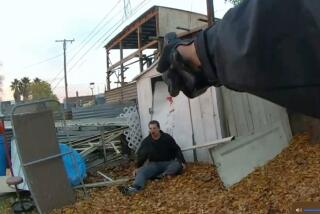City May Settle Lawsuit Over Police Shooting
- Share via
The Los Angeles city attorney’s office has tentatively agreed to pay $350,000 to settle a lawsuit over a police shooting that started with a young man throwing a half-empty beer can at an off-duty LAPD officer’s car and ended with officers storming a home and wounding a man inside, sources said Tuesday.
The case has since resulted in an ethics investigation of the deputy city attorney for failing to disclose key evidence in his defense of the officers.
The proposed settlement must be approved by the City Council before it is final, said civil rights attorney Carol Watson, who represented the man who was shot by police. Two officials with the city attorney’s office confirmed that a proposed deal had been reached, but declined to state the amount of the offer.
The shooting occurred Feb. 8, 1999, as officers searched the Mission Hills home of Steven Short for the man who allegedly threw the can earlier in the evening.
Police had arrived at Short’s home after the off-duty officer drove to the LAPD’s Foothill station and alerted colleagues that someone threw a can at him. Together, they launched a “follow-up” investigation during which they spotted the car involved in the incident. They stopped and handcuffed the driver, and then asked him to make a phone call to surreptitiously find out the whereabouts of the man who threw the can.
According to police, Short, who had nothing to do with the can throwing, emerged from a rear bedroom and pointed a shotgun at Officer Michael Patton. Short allegedly ignored Patton’s commands to drop the weapon, prompting Patton to fire. The officer’s bullet struck Short in the hip.
Short, a television stage worker, offered a different account of the shooting. He said he was asleep in his bedroom when he heard a commotion in his living room, and armed himself with a shotgun to investigate. He said that as soon as he realized Patton was a police officer, he tried to drop his gun, but that Patton shot him before he had a chance.
“Why did you shoot me?” one witness quoted Short as saying to Patton. “You came into my house. I didn’t know you were the police. I was trying to drop the gun.”
Short’s lawsuit against the city and the Police Department went to trial last year and ended with a jury ruling that the officers did not violate his civil rights. But the judge granted Short a new trial after a Times article disclosed that the city attorney defending the officers failed to turn over information that might have bolstered Short’s civil rights claim.
That information consisted of two memos drafted by the LAPD’s inspector general that were highly critical of the conduct of the officers on the night Short was shot.
In one of the memos, Inspector General Jeffrey C. Eglash questioned the legality of the officers’ actions in hunting down the man who had thrown the beer can at the off-duty officer’s car. Eglash called the incident a freelance operation by officers and recommended that a report be sent to the U.S. attorney’s office for possible criminal prosecution.
In an interview in May, Deputy City Atty. Rodell R. Fick said he was aware of the inspector general’s memos and thought he had turned them over to Short’s attorney before the first trial. He said, however, that he did not believe they were relevant to the case.
Later, Fick stated in court and in sworn declarations that he was unaware that the documents existed when the case went to trial. He failed to discover them, Fick said, because he did not view the inspector general’s office as being part of the Police Department and therefore did not seek files from that office.
In addition to seeking LAPD reports, Short’s lawyer Watson had requested that Fick provide her with documents from the city’s Police Commission. The inspector general reports to the commission.
Judge Ralph W. Dau granted Short a new trial because the inspector general’s reports were not provided to Watson and her client. Although the judge said he was unable to determine whether the withheld documents would have changed the outcome of the trial, he said the mere fact that they were not provided resulted in Short being denied a fair trial.
The judge fined the city $22,733 for failing to turn over the documents, and ordered the government to pay Watson’s legal fees, which totaled $128,835. Under the terms of the proposed deal, the fine and legal fees are included in the $350,000 settlement, Watson said.
After the judge’s sanctions, a spokesman from the city attorney’s office said that an internal investigation had been launched into Fick’s conduct.
That investigation is expected to be concluded soon, according to an official in the city attorney’s office who spoke on the condition of anonymity.
More to Read
Sign up for Essential California
The most important California stories and recommendations in your inbox every morning.
You may occasionally receive promotional content from the Los Angeles Times.













